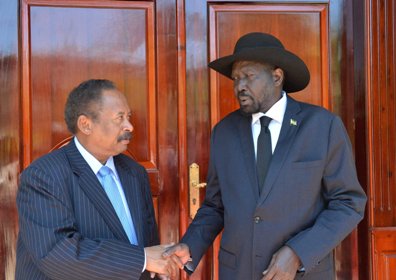Kiir, Hamdok agree to resume discussions on Sudans’ border crossings
September 13, 2019 (JUBA) – Sudan and South Sudan have agreed to resume discussions on the opening of the border crossing points between the two countries.

“We discussed bilateral relations including border and trade and we reached useful understandings that will push the distinguished relations forwards,” Hamdok told reporters in joint press statements with Kiir at the State House before to leave Juba on Friday.
The Sudanese prime minister said he wants to repair the damage caused by the former regime and restore the ancestral relations between people on the border from both sides as the first step towards the resolution of the disputed border zones and Abyei.
“We touched relations between the two countries and what we will do in the future said,” President Kiir said.
“Regarding the opening of border crossing points we will work on it in the near future,” he added before to conclude by saying “God willing peace will prevail in Sudan and South Sudan”.
The South Sudanese leader pointed to the Juba Declaration for peace in Sudan signed by the Sudanese government and the armed groups he would strive to ensure a successful peace in Sudan.
Hamdok said he said he had met with the leaders of the armed groups and expressed hope that the Juba process would lead to lasting peace in his country.
Kiir repeated several times that he wants peace in Sudan for the stability of his country, pointing that the conflict with rebel groups in the border areas contributed to destabilize his country.
Sudan and South Sudan in 2013 had agreed to open 10 crossings along their joint 2,000 km border to boost travel and trade.
But the continuation of armed conflicts in South Kordofan and Blue Nile states and the civil war in South Sudan prevented the implementation of concrete steps to activate the demilitarized zone and define the crossings.
In March 2018, the two countries marked several crossing corridors, but the continuation of the South Sudanese conflict and continuation of suspicions of support to armed groups from both sides remained the main cause behind the border closure for free trade and movement of people.
(ST)
